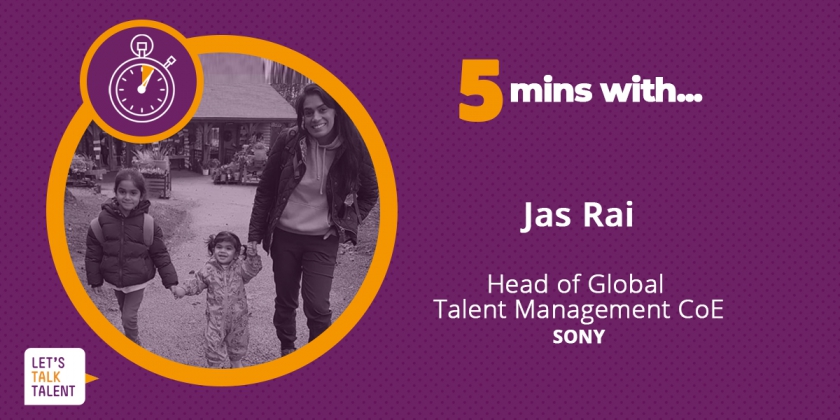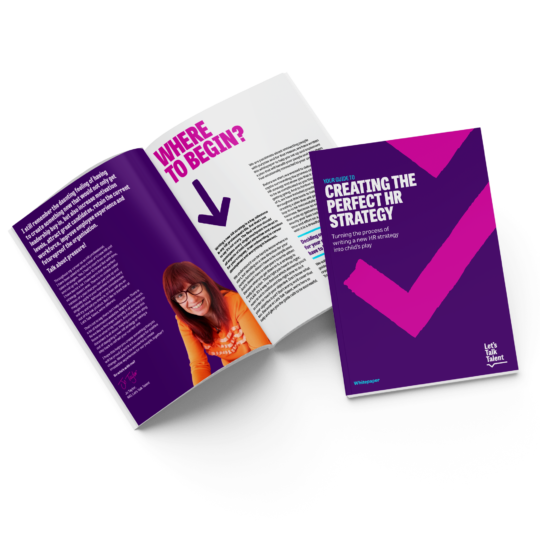We tracked down Jas Rai, Global Talent CoE Leader at Sony in between her flights between London and Japan ahead of our Mind The Tech Gap? roundtable on 9th December.
We had a 5 minute chat with her about her HR career, her biggest achievements to date and how she manages to work at the Japanese HQ from London.
What is your HR background?
I started in recruitment after graduating in 2000. I didn’t really know what I wanted to do, but I really enjoyed the buzz and London life!
I went to work for a large engineering firm and progressed from running a small resourcing team, to heading the early careers development programmes. I took the interesting leap from Recruitment to Development.
I then went to head up an interesting government initiative, taking me away from HR completely. This gave me very good strategic business skills as well as learning how to write papers, navigate very complex stakeholders and how to secure funding!
After a few years I joined Sony, where the strategic business skills and Talent & Development experience came together.
What does your Global Talent CoE leader at Sony Corporation entail?
For someone based in the UK, working for Sony HQ is unique. I am the only person on the Japan org structure not located in Japan.
I technically commute to Japan twice a month and spend the rest of my time at my dining table, the café in David Lloyd or in an airport lounge somewhere.
My role has many facets, getting our teams to work together and share knowledge through collaboration and leading our global HR/ People Projects.
– The launch of Sony’s EVP
– Our new Global Behaviours Framework,
– Launch of Workday talent, learning & recruitment
– Global Talking Talent & Succession planning activity
– Leading the Global Future leaders programme
Today I am heading up “The Virtual Port,” how we create a learning culture across Sony! A very broad but exciting project and one which I present to the board on December 3rd.
When you look at your career to date what has been your biggest achievement?
I think it’s hard to pinpoint a single achievement, so here are a few that changed or influenced the way I work.
Firstly, holding down a full-time career with 2 young girls and a marriage… It’s tough… finding time to talk, to socialise, to lead by example…. I have had to challenge the norm and lead by example.
I took my eldest daughter, India, then aged 6 to Barcelona last December to attend some Workday Project Meetings, I took her to Japan in April to join some talent discussions and I take her frequently into our London office while I have meetings.
I wouldn’t do that with my 2 year old just yet….. but I will soon enough!
More specific to work:
I was very proud in my early career to launch new talent programmes and to see early career talent progress and succeed – even today I still hear from and see some of those individuals.
I worked for a short while on an interesting government project to address our engineering skills shortage in the UK, I was very successful and secured £5m funding from Lord Sainsbury to work with some major players in Industry. This was tough, highly political and I developed my courage and resilience.
At Sony, every project has seen me elevate to new and exciting work. I think Sony has given me confidence in my ability and recognition for navigating a very complex landscape!
What’s your talent philosophy?
Wow, tough question, I guess its more a People philosophy rather than specifically Talent.
“It is not a great thing to make followers,
Let them have the awareness and will to follow.”
This really relates more to how we typically see leaders as leading and followers following –but the influence our followers are having on how we lead is more integral to a leader’s success. For me to do my job, I need to lead, but with so much autonomy within Sony, I need to engage my “followers.”
If you could change one thing in Talent Management right now what would it be?
Controversial for us at Sony, but to stop putting people into boxes and to stop forcing career pathways. Everyone is individual but within learning and HR generally we like to people into buckets/ groups – often assuming someone’s drivers and ambitions.
By having visual career paths and programmes, we believe we are meeting learning needs – yes people like direction, but what one person wants today may look different tomorrow depending on circumstances.
It’s tough to do but giving individuals the tools and support to “manage their own career” should look flexible and autonomous – not just a larger range of career pathways.
What are your biggest challenges as a Talent Coe?
All of our teams are fantastic operationally, but little time is spend thinking strategically. Why are we doing what we are doing and how will we use that information?
Example: we need 9 box on all High Potential Talent…… has anyone really though why? And how do we use that information?
How do you tailor your approaches for different countries or regions?
Every approach is different, from style of discussion to priorities.
For Japan – I need facts, figures, data and a plan! Tangible outcomes is a daily phrase! And that’s regardless of what phase we may be in.
For the US, I need to be prepared for a debate on what we are discussing, my colleagues love a good discussion! That’s putting it very politely.
For Europe, I need them to make time for the discussions – so often need to gate crash their meetings to get FaceTime with them.
How do you measure the success of your strategy?
For us, nothing is mandated, so just to get regions or global businesses engaged and on board is a key measure of success.
For someone who is stepping into a Talent role for the first time, what 3 pieces of advice would you give them?
The Green Cross Code – Stop, Look & Listen.
We love to jump in with our models, impact matrixes and frameworks… HR has its own language and to us sounds great, to the business its considered “fluffy stuff
Take time to know your stakeholders’ business.
Listen to them, understand their challenges, pinch points and then work up most suitable approaches.
Leave out the jargon!

